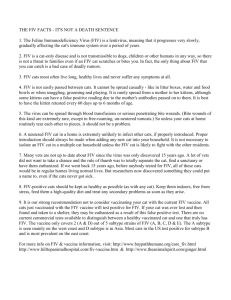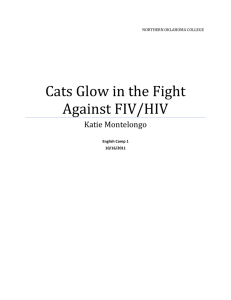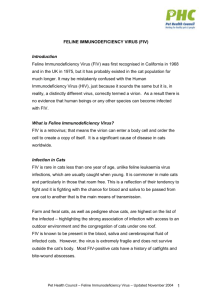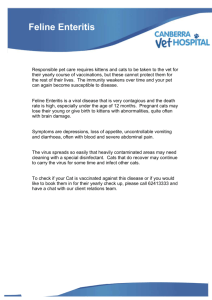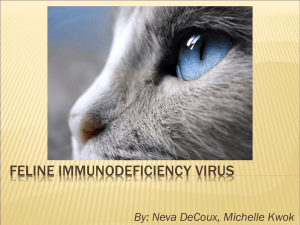FIV IS NOT A DEATH SENTENCE
advertisement
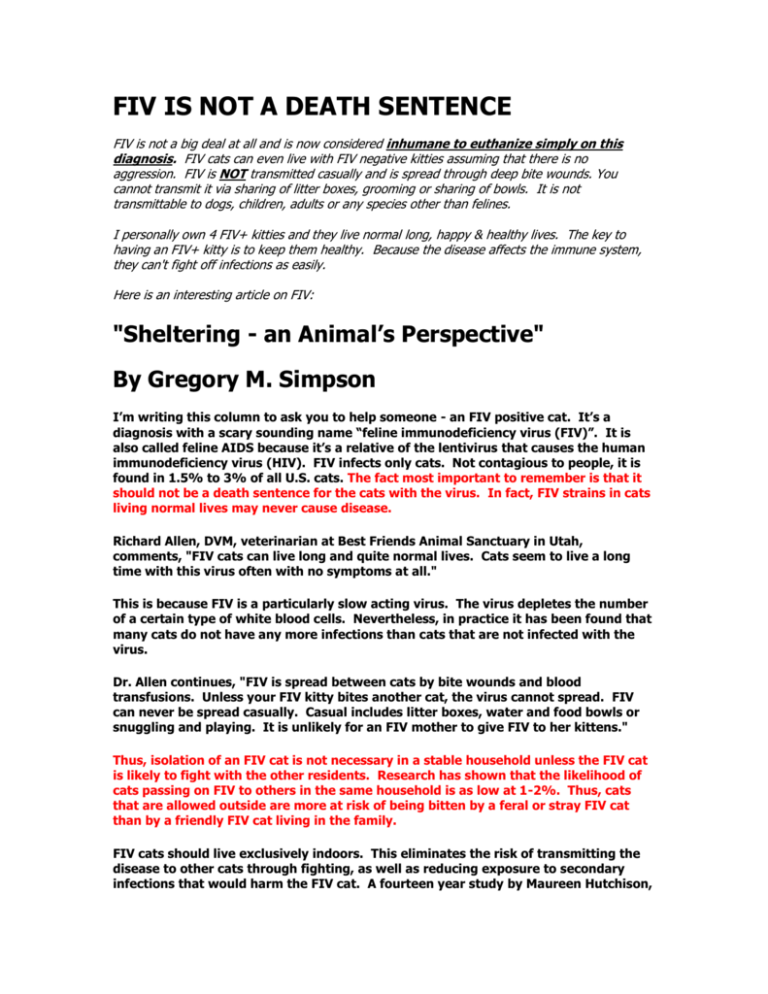
FIV IS NOT A DEATH SENTENCE FIV is not a big deal at all and is now considered inhumane to euthanize simply on this diagnosis. FIV cats can even live with FIV negative kitties assuming that there is no aggression. FIV is NOT transmitted casually and is spread through deep bite wounds. You cannot transmit it via sharing of litter boxes, grooming or sharing of bowls. It is not transmittable to dogs, children, adults or any species other than felines. I personally own 4 FIV+ kitties and they live normal long, happy & healthy lives. The key to having an FIV+ kitty is to keep them healthy. Because the disease affects the immune system, they can't fight off infections as easily. Here is an interesting article on FIV: "Sheltering - an Animal’s Perspective" By Gregory M. Simpson I’m writing this column to ask you to help someone - an FIV positive cat. It’s a diagnosis with a scary sounding name “feline immunodeficiency virus (FIV)”. It is also called feline AIDS because it’s a relative of the lentivirus that causes the human immunodeficiency virus (HIV). FIV infects only cats. Not contagious to people, it is found in 1.5% to 3% of all U.S. cats. The fact most important to remember is that it should not be a death sentence for the cats with the virus. In fact, FIV strains in cats living normal lives may never cause disease. Richard Allen, DVM, veterinarian at Best Friends Animal Sanctuary in Utah, comments, "FIV cats can live long and quite normal lives. Cats seem to live a long time with this virus often with no symptoms at all." This is because FIV is a particularly slow acting virus. The virus depletes the number of a certain type of white blood cells. Nevertheless, in practice it has been found that many cats do not have any more infections than cats that are not infected with the virus. Dr. Allen continues, "FIV is spread between cats by bite wounds and blood transfusions. Unless your FIV kitty bites another cat, the virus cannot spread. FIV can never be spread casually. Casual includes litter boxes, water and food bowls or snuggling and playing. It is unlikely for an FIV mother to give FIV to her kittens." Thus, isolation of an FIV cat is not necessary in a stable household unless the FIV cat is likely to fight with the other residents. Research has shown that the likelihood of cats passing on FIV to others in the same household is as low at 1-2%. Thus, cats that are allowed outside are more at risk of being bitten by a feral or stray FIV cat than by a friendly FIV cat living in the family. FIV cats should live exclusively indoors. This eliminates the risk of transmitting the disease to other cats through fighting, as well as reducing exposure to secondary infections that would harm the FIV cat. A fourteen year study by Maureen Hutchison, veterinary advisor to Cat Action Trust, found that FIV cats are more likely to die by being killed in road accidents, or to be alive and well into their twilight years, than they are to die from any FIV related condition. Another study at the University of Glasgow in Scotland found that the monitored cats’ FIV infections did not affect the cats’ life expectancies. Therefore, knowing what we now do about the prolonged nature of FIV, euthanasia is totally inappropriate and inhumane. One American study showed that FIV cats are far more likely to lose their lives through euthanasia when no one offers them a home, than from any effects of the virus. So, please, give an FIV-positive cat a chance for life and a loving home. Provide the cat with good nutrition, regular vaccinations and veterinary visits. Don’t forget that love is a powerful immune system enhancer. Cherish your FIV cat! For the animals, Gregory M. Simpson


